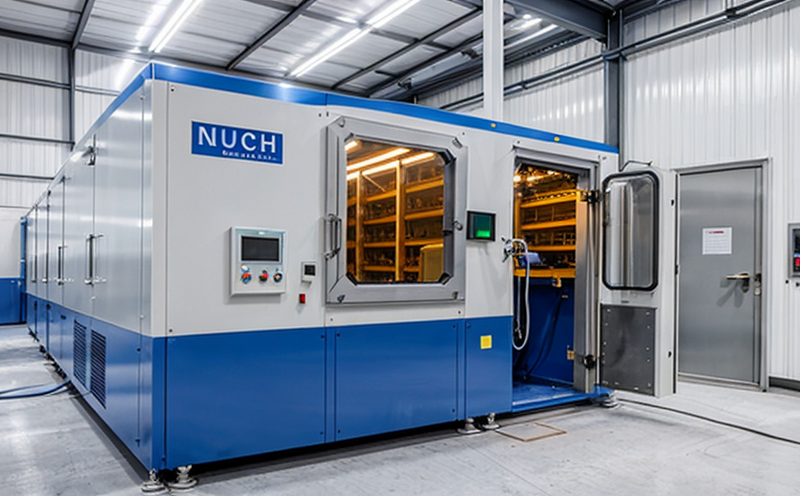Notch sensitivity testing for materials in cryogenic conditions
Unlocking Material Performance Notch Sensitivity Testing for Cryogenic Conditions
As businesses increasingly rely on advanced materials to drive innovation and efficiency, the need for rigorous testing and evaluation has never been greater. One critical aspect of material assessment is notch sensitivity testing, particularly in cryogenic conditions. At Eurolab, we specialize in providing comprehensive laboratory services that help clients unlock the full potential of their materials. In this article, we will delve into the world of notch sensitivity testing for materials in cryogenic conditions and explore its significance for businesses.
What is Notch Sensitivity Testing for Materials in Cryogenic Conditions?
Notch sensitivity testing involves evaluating a materials propensity to crack or fail when subjected to a stress concentrator, such as a notch. This type of testing is crucial in cryogenic conditions, where materials are exposed to extreme temperatures that can significantly impact their mechanical properties. By simulating real-world scenarios and pushing materials to their limits, Eurolabs notch sensitivity testing services help manufacturers understand how their products will behave under extreme conditions.
Why is Notch Sensitivity Testing Essential for Businesses?
In todays fast-paced business environment, companies must continually strive for innovation, efficiency, and reliability. Notch sensitivity testing plays a vital role in ensuring the integrity of materials used in various applications. Here are some key benefits
Enhanced Safety By identifying potential weaknesses in materials, businesses can minimize the risk of accidents, injuries, or even catastrophic failures.
Improved Efficiency Accurate notch sensitivity testing enables manufacturers to optimize material selection and processing techniques, reducing waste and increasing productivity.
Increased Reliability Companies that invest in thorough material evaluation can offer more reliable products, which is essential for maintaining customer trust and loyalty.
Compliance with Regulations Notch sensitivity testing helps businesses meet industry standards and regulatory requirements, avoiding costly rework or penalties.
Benefits of Using Notch Sensitivity Testing for Materials in Cryogenic Conditions
Eurolabs notch sensitivity testing services are specifically designed to address the unique challenges posed by cryogenic conditions. By choosing our laboratory services, you can
Optimize Material Selection Understand how different materials perform under extreme temperatures and make informed decisions about material selection.
Minimize Risk of Failure Identify potential weaknesses in your products and take corrective action before catastrophic failures occur.
Improve Product Performance Develop materials that are optimized for specific applications, resulting in enhanced product performance and user experience.
Reduce Costs Avoid costly rework or penalties associated with non-compliance by ensuring your materials meet industry standards.
How Does Notch Sensitivity Testing Work?
Eurolabs notch sensitivity testing process involves several key steps
Material Selection Choose the material(s) to be tested, taking into account factors such as composition, processing history, and intended application.
Notch Creation Create a notch or stress concentrator on the material surface using precision techniques.
Testing Parameters Establish testing parameters, including temperature, strain rate, and loading conditions.
Loading and Testing Apply controlled loads to the notched specimen while it is immersed in cryogenic fluids (e.g., liquid nitrogen or liquid helium).
Data Analysis Analyze test data to determine notch sensitivity and derive key material properties.
Frequently Asked Questions
Q What types of materials can be tested using Eurolabs notch sensitivity testing services?
A Our laboratory specializes in testing a wide range of materials, including metals (e.g., steel, aluminum, titanium), polymers, ceramics, and composites.
Q How do I prepare my material samples for testing?
A Material preparation involves several steps, including sample selection, machining, and surface treatment. Eurolabs experienced technicians will guide you through the process to ensure optimal test results.
Q Can I request custom testing parameters or conditions?
A Yes! Our laboratory is designed to accommodate customized testing requirements. Simply discuss your specific needs with our team, and well work with you to develop a tailored testing plan.
Q What kind of data can I expect from notch sensitivity testing?
A Test results typically include key material properties such as notch sensitivity (KIC), fracture toughness (Kc), and ductile-to-brittle transition temperature (DBTT).
Conclusion
Notch sensitivity testing for materials in cryogenic conditions is a critical evaluation tool that helps businesses ensure the integrity of their products. By leveraging Eurolabs expert laboratory services, manufacturers can unlock material performance, minimize risk, and optimize efficiency. Whether youre developing cutting-edge technologies or improving existing products, our notch sensitivity testing capabilities will help you achieve your goals.
About Eurolab
At Eurolab, we are dedicated to providing top-tier laboratory services that empower businesses to drive innovation and success. Our team of experts is committed to delivering accurate results, exceptional customer service, and timely project completion. Trust Eurolab for all your material evaluation needs and take the first step towards unlocking your products full potential.




